法律英语练习题
- 格式:doc
- 大小:62.00 KB
- 文档页数:8
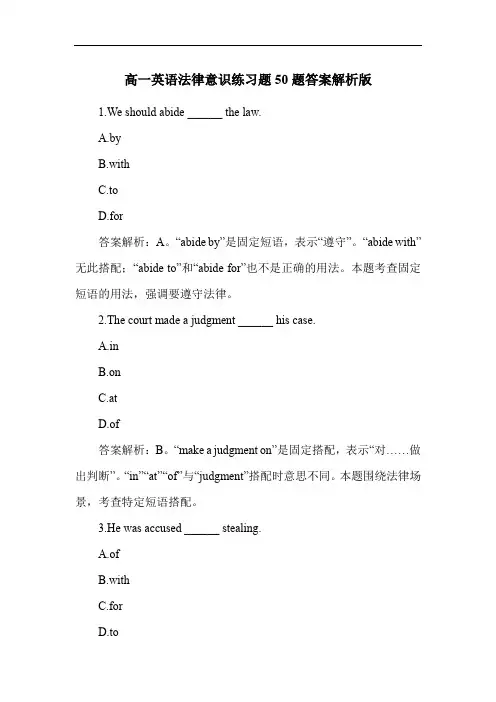
高一英语法律意识练习题50题答案解析版1.We should abide ______ the law.A.byB.withC.toD.for答案解析:A。
“abide by”是固定短语,表示“遵守”。
“abide with”无此搭配;“abide to”和“abide for”也不是正确的用法。
本题考查固定短语的用法,强调要遵守法律。
2.The court made a judgment ______ his case.A.inB.onC.atD.of答案解析:B。
“make a judgment on”是固定搭配,表示“对……做出判断”。
“in”“at”“of”与“judgment”搭配时意思不同。
本题围绕法律场景,考查特定短语搭配。
3.He was accused ______ stealing.A.ofB.withC.forD.to答案解析:A。
“be accused of”是固定短语,表示“被指控……”。
“with”“for”“to”与“accused”搭配错误。
本题考查常见的法律相关短语。
4.The lawyer presented strong evidence ______ his client.A.forB.toC.withD.on答案解析:A。
“present evidence for”表示“为……提供证据”。
“to”“with”“on”与“evidence”搭配时意思不同。
本题考查法律场景下的短语用法。
5.The police are responsible ______ maintaining law and order.A.forB.toC.withD.on答案解析:A。
“be responsible for”是固定短语,表示“对……负责”。
“to”“with”“on”与“responsible”搭配错误。
本题涉及法律场景中警察的职责。
6.She filed a lawsuit ______ the company.A.againstB.withC.for答案解析:A。
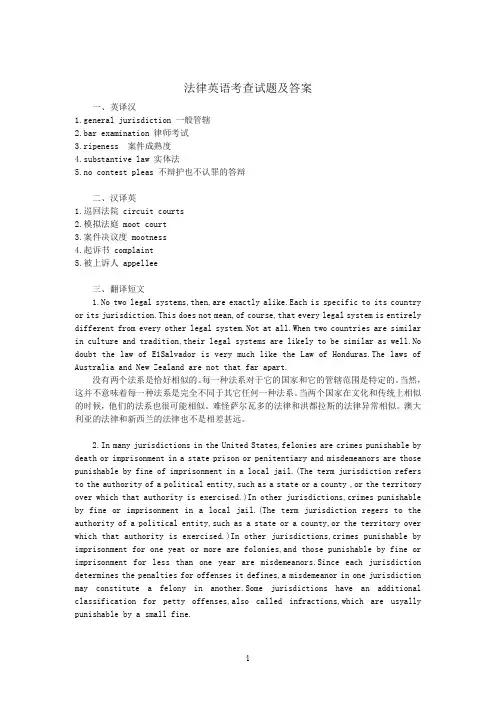
法律英语考查试题及答案一、英译汉1.general jurisdiction 一般管辖2.bar examination 律师考试3.ripeness 案件成熟度4.substantive law 实体法5.no contest pleas 不辩护也不认罪的答辩二、汉译英1.巡回法院 circuit courts2.模拟法庭 moot court3.案件决议度 mootness4.起诉书 complaint5.被上诉人 appellee三、翻译短文1.No two legal systems,then,are exactly alike.Each is specific to its country or its jurisdiction.This does not mean,of course,that every legal system is entirely different from every other legal system.Not at all.When two countries are similar in culture and tradition,their legal systems are likely to be similar as well.No doubt the law of E1Salvador is very much like the Law of Honduras.The laws of Australia and New Zealand are not that far apart.没有两个法系是恰好相似的。
每一种法系对于它的国家和它的管辖范围是特定的。
当然,这并不意味着每一种法系是完全不同于其它任何一种法系。
当两个国家在文化和传统上相似的时候,他们的法系也很可能相似。
难怪萨尔瓦多的法律和洪都拉斯的法律异常相似。
澳大利亚的法律和新西兰的法律也不是相差甚远。
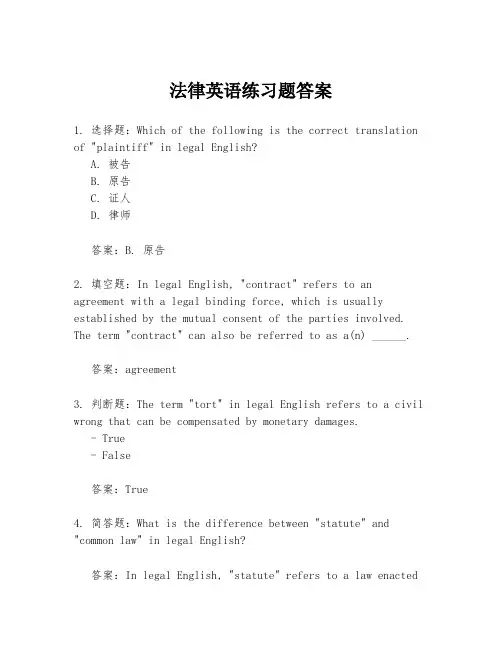
法律英语练习题答案1. 选择题:Which of the following is the correct translation of "plaintiff" in legal English?A. 被告B. 原告C. 证人D. 律师答案:B. 原告2. 填空题:In legal English, "contract" refers to an agreement with a legal binding force, which is usually established by the mutual consent of the parties involved. The term "contract" can also be referred to as a(n) ______.答案:agreement3. 判断题:The term "tort" in legal English refers to a civil wrong that can be compensated by monetary damages.- True- False答案:True4. 简答题:What is the difference between "statute" and "common law" in legal English?答案:In legal English, "statute" refers to a law enactedby a legislative body, whereas "common law" refers to the body of law derived from judicial decisions of courts and similar tribunals.5. 翻译题:请将以下句子翻译成英文。
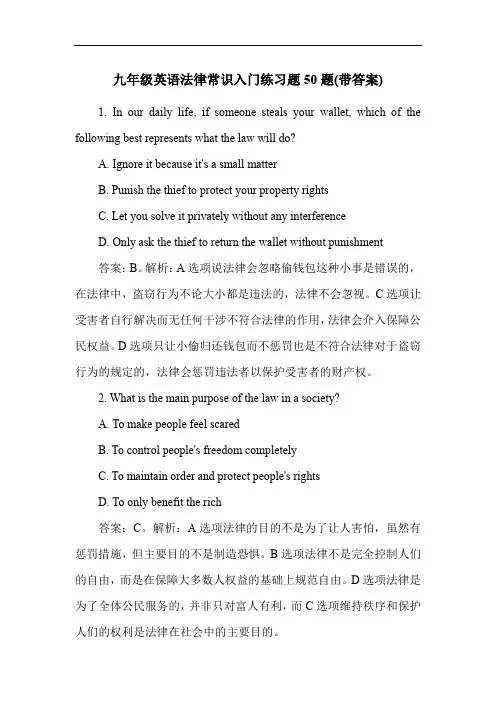
九年级英语法律常识入门练习题50题(带答案)1. In our daily life, if someone steals your wallet, which of the following best represents what the law will do?A. Ignore it because it's a small matterB. Punish the thief to protect your property rightsC. Let you solve it privately without any interferenceD. Only ask the thief to return the wallet without punishment答案:B。
解析:A选项说法律会忽略偷钱包这种小事是错误的,在法律中,盗窃行为不论大小都是违法的,法律不会忽视。
C选项让受害者自行解决而无任何干涉不符合法律的作用,法律会介入保障公民权益。
D选项只让小偷归还钱包而不惩罚也是不符合法律对于盗窃行为的规定的,法律会惩罚违法者以保护受害者的财产权。
2. What is the main purpose of the law in a society?A. To make people feel scaredB. To control people's freedom completelyC. To maintain order and protect people's rightsD. To only benefit the rich答案:C。
解析:A选项法律的目的不是为了让人害怕,虽然有惩罚措施,但主要目的不是制造恐惧。
B选项法律不是完全控制人们的自由,而是在保障大多数人权益的基础上规范自由。
D选项法律是为了全体公民服务的,并非只对富人有利,而C选项维持秩序和保护人们的权利是法律在社会中的主要目的。
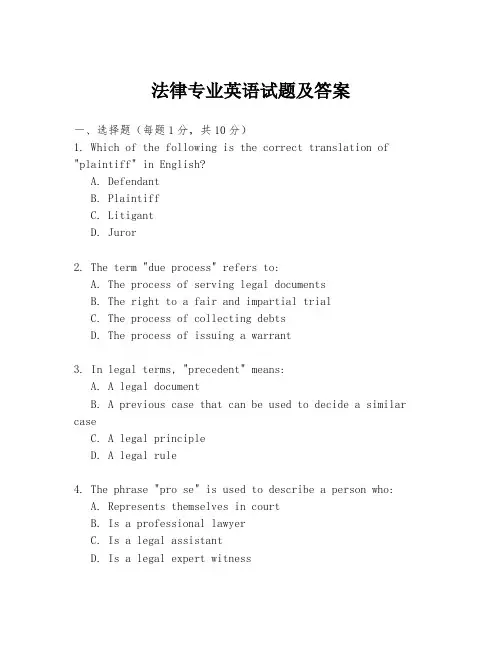
法律专业英语试题及答案一、选择题(每题1分,共10分)1. Which of the following is the correct translation of "plaintiff" in English?A. DefendantB. PlaintiffC. LitigantD. Juror2. The term "due process" refers to:A. The process of serving legal documentsB. The right to a fair and impartial trialC. The process of collecting debtsD. The process of issuing a warrant3. In legal terms, "precedent" means:A. A legal documentB. A previous case that can be used to decide a similar caseC. A legal principleD. A legal rule4. The phrase "pro se" is used to describe a person who:A. Represents themselves in courtB. Is a professional lawyerC. Is a legal assistantD. Is a legal expert witness5. Which of the following is not a type of legal document?A. ContractB. DeedC. WillD. Invoice6. The term "bail" refers to:A. A legal obligationB. A sum of money given to ensure the appearance of a defendant in courtC. A legal feeD. A court order7. "Statute of limitations" is a legal term that means:A. The deadline for filing a lawsuitB. The time limit for a court to make a decisionC. The time limit for a defendant to respond to a lawsuitD. The time limit for a witness to testify8. "Probate" is the legal process of:A. Filing a lawsuitB. Administering an estate after someone's deathC. Issuing a court orderD. Enforcing a contract9. The "Bill of Rights" is a term commonly associated with:A. The first ten amendments to the United States ConstitutionB. A list of legal rights in a contractC. A document outlining the rights of defendantsD. A set of rules for a court proceeding10. "Tort" is a legal term that refers to:A. A criminal actB. A civil wrong that can result in compensationC. A legal documentD. A type of contract二、填空题(每题1分,共10分)1. The legal term for a formal accusation against someone is a(n) _______.2. A(n) _______ is a person who has been granted permission to practice law.3. "Injunction" refers to a court order that requires someone to do, or not do, something.4. The process of a court determining the rights and obligations of parties in a dispute is called _______.5. "Affidavit" is a written statement of facts confirmed by the oath of the party making it, which is used as evidence in court.6. A(n) _______ is a legal document that outlines the terms and conditions of an agreement.7. The term "eminent domain" refers to the power of the government to take private property for public use.8. "Misdemeanor" is a(n) _______ crime, less serious than a felony.9. A(n) _______ is a legal document that proves ownership of property.10. "Litigation" is the process of taking a dispute to court to resolve it through a formal hearing.三、简答题(每题5分,共20分)1. Explain the concept of "double jeopardy" in legal terms.2. What are the main differences between civil law and common law systems?3. Describe the role of a judge in a criminal trial.4. What is the purpose of a "plea bargain" in the legal process?四、论述题(每题15分,共30分)1. Discuss the importance of legal ethics in the practice of law.2. Analyze the impact of globalization on the legal profession.五、翻译题(每题5分,共10分)1. 请将以下句子翻译成英文:“在法律面前,人人平等。
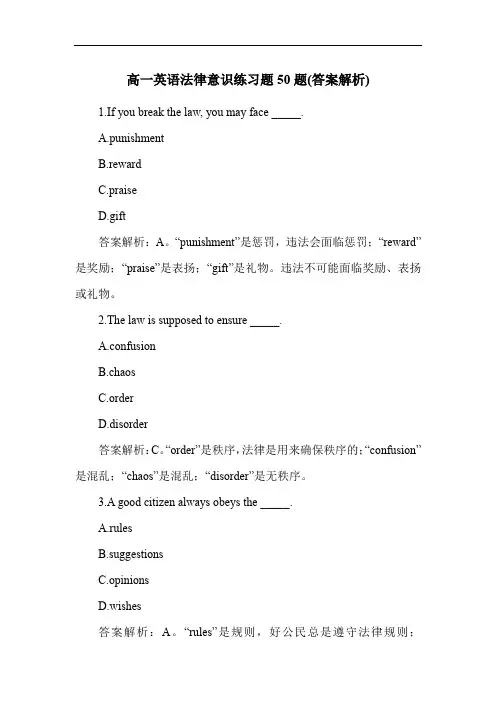
高一英语法律意识练习题50题(答案解析)1.If you break the law, you may face _____.A.punishmentB.rewardC.praiseD.gift答案解析:A。
“punishment”是惩罚,违法会面临惩罚;“reward”是奖励;“praise”是表扬;“gift”是礼物。
违法不可能面临奖励、表扬或礼物。
2.The law is supposed to ensure _____.A.confusionB.chaosC.orderD.disorder答案解析:C。
“order”是秩序,法律是用来确保秩序的;“confusion”是混乱;“chaos”是混乱;“disorder”是无秩序。
3.A good citizen always obeys the _____.A.rulesB.suggestionsC.opinionsD.wishes答案解析:A。
“rules”是规则,好公民总是遵守法律规则;“suggestions”是建议;“opinions”是意见;“wishes”是愿望。
4.The police enforce the _____.wsB.ideasC.dreamsD.plans答案解析:A。
“laws”是法律,警察执行法律;“ideas”是想法;“dreams”是梦想;“plans”是计划。
5.Legal actions are taken to protect people's _____.A.interestsB.hobbiesC.pastimesD.leisure答案解析:A。
“interests”是利益,法律行动是为了保护人们的利益;“hobbies”是爱好;“pastimes”是消遣;“leisure”是闲暇。
6.A lawyer is trained to understand and apply the _____.A.booksB.magazineswsD.newspapers答案解析:C。
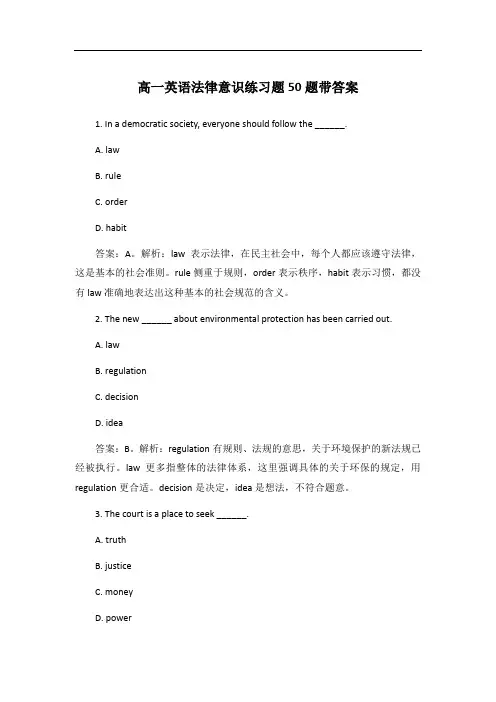
高一英语法律意识练习题50题带答案1. In a democratic society, everyone should follow the ______.A. lawB. ruleC. orderD. habit答案:A。
解析:law表示法律,在民主社会中,每个人都应该遵守法律,这是基本的社会准则。
rule侧重于规则,order表示秩序,habit表示习惯,都没有law准确地表达出这种基本的社会规范的含义。
2. The new ______ about environmental protection has been carried out.A. lawB. regulationC. decisionD. idea答案:B。
解析:regulation有规则、法规的意思,关于环境保护的新法规已经被执行。
law更多指整体的法律体系,这里强调具体的关于环保的规定,用regulation更合适。
decision是决定,idea是想法,不符合题意。
3. The court is a place to seek ______.A. truthB. justiceC. moneyD. power答案:B。
解析:justice表示正义,法院是寻求正义的地方。
truth表示真相,虽然法院也追求真相,但justice更能体现法院的职能,即维护公平正义。
money 金钱和power权力都与法院的职能不相符。
4. If you break the ______, you may be punished.A. lawB. promiseC. gameD. friendship答案:A。
解析:break the law是固定搭配,表示违反法律。
如果违反法律就可能受到惩罚。
promise是承诺,break the promise是违背承诺;game是游戏,friendship是友谊,都不符合这里的语境。
5. A good citizen should respect all the ______ in the country.A. lawsB. leadersC. buildingsD. trees答案:A。
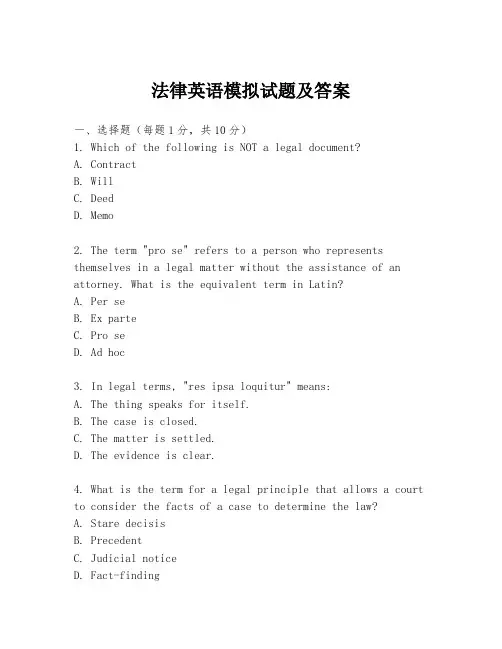
法律英语模拟试题及答案一、选择题(每题1分,共10分)1. Which of the following is NOT a legal document?A. ContractB. WillC. DeedD. Memo2. The term "pro se" refers to a person who represents themselves in a legal matter without the assistance of an attorney. What is the equivalent term in Latin?A. Per seB. Ex parteC. Pro seD. Ad hoc3. In legal terms, "res ipsa loquitur" means:A. The thing speaks for itself.B. The case is closed.C. The matter is settled.D. The evidence is clear.4. What is the term for a legal principle that allows a court to consider the facts of a case to determine the law?A. Stare decisisB. PrecedentC. Judicial noticeD. Fact-finding5. Which of the following is NOT a type of legal system?A. Common lawB. Civil lawC. Religious lawD. Equitable law6. The phrase "habeas corpus" is used to challenge:A. The legality of detention.B. The validity of a contract.C. The jurisdiction of a court.D. The admissibility of evidence.7. The term "actus reus" in criminal law refers to:A. The guilty mind.B. The guilty act.C. The motive for the crime.D. The opportunity for the crime.8. In the context of a legal dispute, "burden of proof" refers to:A. The responsibility to prove a claim or defense.B. The responsibility to pay legal fees.C. The responsibility to provide evidence.D. The responsibility to show up in court.9. "Caveat emptor" is a legal principle that means:A. Let the buyer beware.B. Let the seller beware.C. The contract is void.D. The transaction is complete.10. The term "precedent" in legal terms means:A. A legal principle or rule established in a previous legal case.B. A legal document that sets a standard.C. A legal agreement between parties.D. A legal decision that is final.二、填空题(每题1分,共5分)11. A legal document that outlines the terms and conditions of a sale is called a(n) ______.12. The legal principle that states that a person is innocent until proven guilty is known as ______.13. The term "eminent domain" refers to the power of the state to take private property for ______.14. In legal terms, "estoppel" is a principle that prevents a person from denying the truth of a previous ______.15. A "plea bargain" is an agreement in a criminal case where the defendant agrees to plead guilty to a lesser charge in exchange for a ______.三、简答题(每题5分,共20分)16. Define the term "due process" in the context of legal proceedings.17. Explain the concept of "joint and several liability" in the context of a legal claim.18. What is the purpose of a "cease and desist" letter in legal disputes?19. Describe the role of a "guardian ad litem" in a legal case involving a minor.四、案例分析题(每题15分,共30分)20. A company is being sued for copyright infringement. The company claims that they were not aware of the infringement and that it was an honest mistake. Discuss the possible defenses the company might raise and the likelihood of their success.21. A landlord is suing a tenant for unpaid rent. The tenant claims that the apartment was uninhabitable due to a leaking roof and poor heating. Analyze the tenant's potential defenses and the possible outcomes of the case.五、论述题(15分)22. Discuss the importance of understanding legal English in the context of international business transactions. Include examples of common legal terms and their implications in contracts.答案:一、选择题1-5: D C A D C6-10: A B B A A二、填空题11. Contract12. Presumption of innocence13. public use14. representation15. reduced sentence三、简答题16. Due process refers to the fundamental, constitutionalright of all individuals to receive fair treatment by the justice system. It includes the right to notice, the right to be heard, and the right to a fair and impartial tribunal. 17. Joint and several liability means that in a legal claim, each party responsible for the harm caused can be held liable for the entire amount of the damages, regardless of their individual contribution to the harm.18. A cease and desist letter is a formal warning sent by one party to another, demanding that the recipient stop an。
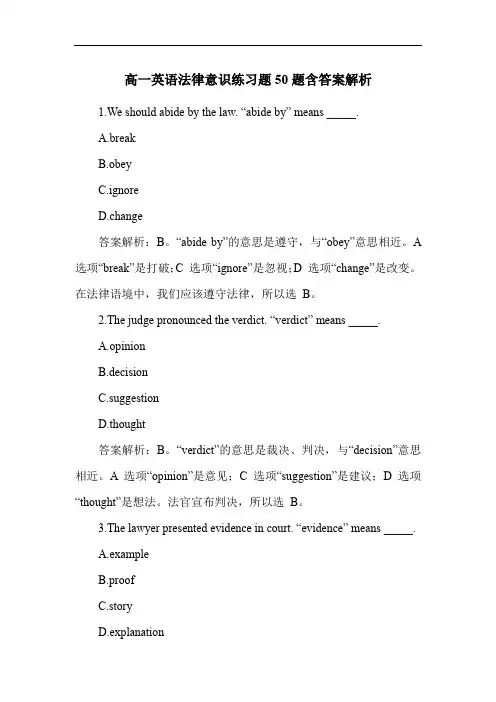
高一英语法律意识练习题50题含答案解析1.We should abide by the law. “abide by” means _____.A.breakB.obeyC.ignoreD.change答案解析:B。
“abide by”的意思是遵守,与“obey”意思相近。
A 选项“break”是打破;C 选项“ignore”是忽视;D 选项“change”是改变。
在法律语境中,我们应该遵守法律,所以选B。
2.The judge pronounced the verdict. “verdict” means _____.A.opinionB.decisionC.suggestionD.thought答案解析:B。
“verdict”的意思是裁决、判决,与“decision”意思相近。
A 选项“opinion”是意见;C 选项“suggestion”是建议;D 选项“thought”是想法。
法官宣布判决,所以选B。
3.The lawyer presented evidence in court. “evidence” means _____.A.exampleB.proofC.storyD.explanation答案解析:B。
“evidence”的意思是证据,与“proof”意思相近。
A 选项“example”是例子;C 选项“story”是故事;D 选项“explanation”是解释。
律师在法庭上出示证据,所以选B。
4.The police enforce the law. “enforce” means _____.A.makeB.breakC.obeyD.carry out答案解析:D。
“enforce”的意思是执行、实施,与“carry out”意思相近。
A 选项“make”是制作;B 选项“break”是打破;C 选项“obey”是遵守。
警察执行法律,所以选D。
5.The criminal was sentenced to prison. “sentence” means _____.A.punishB.judgeC.decideD.condemn答案解析:A。
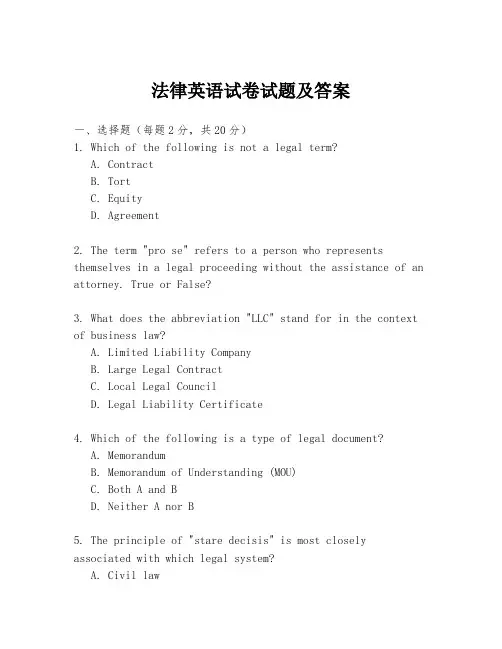
法律英语试卷试题及答案一、选择题(每题2分,共20分)1. Which of the following is not a legal term?A. ContractB. TortC. EquityD. Agreement2. The term "pro se" refers to a person who represents themselves in a legal proceeding without the assistance of an attorney. True or False?3. What does the abbreviation "LLC" stand for in the context of business law?A. Limited Liability CompanyB. Large Legal ContractC. Local Legal CouncilD. Legal Liability Certificate4. Which of the following is a type of legal document?A. MemorandumB. Memorandum of Understanding (MOU)C. Both A and BD. Neither A nor B5. The principle of "stare decisis" is most closely associated with which legal system?A. Civil lawB. Common lawC. Religious lawD. International law6. What is the term for the legal process of resolving disputes outside the court system?A. LitigationB. MediationC. ArbitrationD. Negotiation7. In the context of intellectual property law, "patent" refers to:A. A right to exclude others from making, using, or selling an inventionB. A document that grants ownership of a work of literature or artC. A legal document that protects a brand name or logoD. A license to practice a profession8. Which of the following is a fundamental principle of criminal law?A. Presumption of innocenceB. Right to a fair trialC. Both A and BD. Neither A nor B9. The term "precedent" in legal English refers to:A. A legal principle or rule established in a previous case that is binding in courtB. A document that outlines the facts of a caseC. A legal agreement between partiesD. A formal request for a court to review a case10. What does the term "actus reus" mean in criminal law?A. The guilty mindB. The wrongful actC. The criminal intentD. The legal defense二、填空题(每空1分,共10分)11. In legal English, "due process" refers to the fundamental legal rights that must be observed to ensure a fair trial.- The term "due process" is derived from the Latin phrase "due process of law."12. A "writ" is a formal written order issued by a court, typically directed to someone other than the parties in a case.- An example of a writ is a "writ of _habeas corpus_."13. The term "negligence" in tort law refers to the failure to exercise the degree of care that a reasonable person would exercise in the same situation to prevent harm to others.- In order to establish negligence, a plaintiff must prove the defendant's duty of care, breach of that duty, causation, and _damages_.14. "Probate" is the legal process by which a will is proved to be valid or invalid.- The court that oversees probate proceedings is known as the _probate court_.15. "Jurisdiction" refers to the authority of a court to hear and decide cases.- There are different types of jurisdiction, including_personal jurisdiction_, subject matter jurisdiction, and territorial jurisdiction.三、简答题(每题5分,共20分)16. Define "actus reus" and "mens rea" in the context of criminal law.17. Explain the concept of "joint and several liability" in tort law.18. What is the difference between "specific performance" and "damages" as remedies in contract law?19. Describe the process of "discovery" in civil litigation.四、案例分析题(每题15分,共30分)20. Case Study: A company has been accused of patent infringement. The company argues that they were not aware of the patent and therefore should not be held liable. Discuss the legal principles that may apply to this case and the possible outcomes.21. Case Study: A tenant has been evicted from their apartment without proper notice. The tenant claims that the eviction was unlawful. Analyze the relevant legal provisions and discuss the tenant's potential remedies.五、论述题(共20分)22. Discuss the role of language in legal interpretation and the challenges it presents. Provide examples to support your argument.参考答案:一、选择题1-5: D T A B B6-10: B C A B B二、填空题11. "due process of law"。
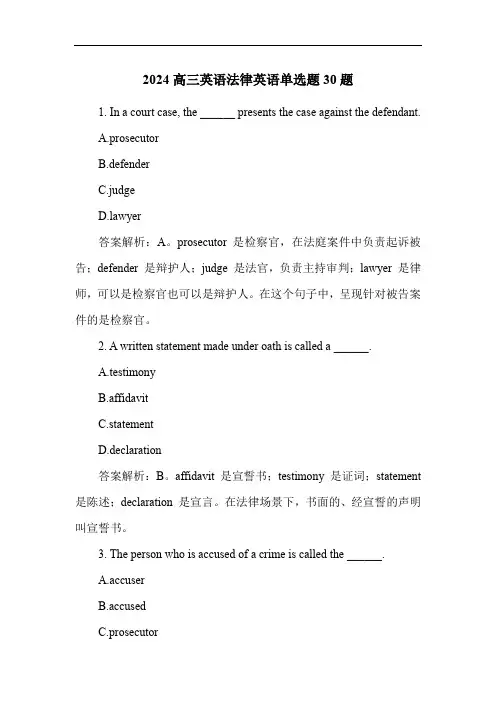
2024高三英语法律英语单选题30题1. In a court case, the ______ presents the case against the defendant.A.prosecutorB.defenderC.judgewyer答案解析:A。
prosecutor 是检察官,在法庭案件中负责起诉被告;defender 是辩护人;judge 是法官,负责主持审判;lawyer 是律师,可以是检察官也可以是辩护人。
在这个句子中,呈现针对被告案件的是检察官。
2. A written statement made under oath is called a ______.A.testimonyB.affidavitC.statementD.declaration答案解析:B。
affidavit 是宣誓书;testimony 是证词;statement 是陈述;declaration 是宣言。
在法律场景下,书面的、经宣誓的声明叫宣誓书。
3. The person who is accused of a crime is called the ______.A.accuserB.accusedC.prosecutorD.defendant答案解析:D。
defendant 是被告;accused 也是被告,但这个词通常作后置定语;accuser 是原告;prosecutor 是检察官。
被指控犯罪的人是被告。
4. A decision made by a judge is called a ______.A.rulingB.decisionC.judgmentD.opinion答案解析:C。
judgment 是判决;ruling 通常指的是裁定;decision 是决定;opinion 是意见。
法官做出的决定叫判决。
5. The place where a trial takes place is called a ______.A.courtroomB.courthousewcourtD.judicial hall答案解析:A。
法律英语试题库及答案一、单选题(每题2分,共20分)1. Which of the following is the correct translation of "plaintiff" in legal English?A. 被告B. 原告C. 证人D. 律师答案:B2. The term "due diligence" in legal context typically refers to:A. 尽职调查B. 尽责调查C. 尽职尽责调查D. 尽职尽责尽责调查答案:A3. In legal English, "contract" is often used to refer to:A. 合同B. 契约C. 协议D. 协议书答案:A4. The phrase "in consideration of" is commonly used in legal documents to mean:A. 鉴于B. 考虑到C. 由于D. 因为答案:B5. Which of the following is not a type of intellectual property?A. 商标B. 专利C. 版权D. 商业秘密答案:D6. The term "tort" in legal English refers to:A. 侵权行为B. 犯罪行为C. 合同违约D. 民事纠纷答案:A7. "Jurisdiction" in legal English means:A. 管辖权B. 审判权C. 执行权D. 立法权答案:A8. The abbreviation "LLC" stands for:A. Limited Liability CompanyB. Limited Legal CompanyC. Legal Liability CompanyD. Legal Limited Company答案:A9. "Probate" in legal English refers to the process of:A. 遗嘱认证B. 遗嘱执行C. 遗嘱公证D. 遗嘱登记答案:A10. "Statute" in legal English is used to denote:A. 法规B. 法律C. 法令D. 条例答案:B二、填空题(每题2分,共20分)1. The legal term for a formal written statement submitted toa court is a(n) _____________.答案:brief2. A(n) _____________ is a legal document that outlines the terms and conditions of a contract.答案:agreement3. The process of challenging the validity of a will is known as _____________.答案:contest4. A(n) _____________ is a legal professional who represents clients in court.答案:attorney5. The term _____________ refers to the legal principle that no one may profit from their own wrongdoing.答案:unclean hands6. A(n) _____________ is a legal document that grants a person the authority to act on behalf of another.答案:power of attorney7. The legal term for a formal written request to a court is a(n) _____________.答案:petition8. A(n) _____________ is a legal document that provides evidence of a debt.答案:promissory note9. The legal term for a formal written order from a court is a(n) _____________.答案:decree10. A(n) _____________ is a legal document that outlines the terms and conditions of a sale of real estate.答案:deed三、判断题(每题2分,共20分)1. The term "lien" in legal English refers to a legal claim on property to secure the payment of a debt. (对/错)答案:对2. "Negligence" in legal English means the failure to exercise reasonable care, resulting in harm to another. (对/错)答案:对3. "Indemnity" in legal English refers to the right to be compensated for a loss or damage suffered. (对/错)答案:对4. A "writ" is a legal document issued by a court that ordersa person to do or refrain from doing a specific act. (对/错) 答案:对5. "Affidavit" in legal English is a written statement of facts voluntarily made by a person under oath. (对/错)答案:对6. "Misdemeanor" in legal English refers to a less serious crime than a felony. (对/错)答案:对7. "Arbitration" is a form of alternative dispute resolution where a neutral third party makes a binding decision. (对/错) 答案:对8. "Eminent domain" refers to the power of the government to take private property for public use without compensation. (对/错)答案:错9. "Venue" in legal English refers to the geographical location where a legal action is brought. (对/错)答案:对10. "Custody" in。
法律英语试题及答案一、单项选择题(每题2分,共10题,满分20分)1. Which of the following is not a legal term?A. PlaintiffB. DefendantC. LitigationD. Negotiation答案:D2. In legal English, "due process" refers to:A. A fair and just legal procedureB. A quick legal procedureC. A legal procedure without any delayD. A legal procedure with minimal paperwork答案:A3. The term "precedent" in law means:A. A previous case that sets a legal principleB. A document that records a legal decisionC. A legal principle that is not bindingD. A case that is not relevant to current legal issues 答案:A4. Which of the following is not a type of contract?A. Sales contractB. Employment contractC. Marriage contractD. Insurance contract答案:C5. "Tort" in legal English refers to:A. A civil wrongB. A criminal actC. A legal documentD. A legal remedy答案:A6. "Probate" is the legal process of:A. Dividing an estate after deathB. Filing a lawsuitC. Registering a trademarkD. Drafting a will答案:A7. "Jurisdiction" in law refers to:A. The authority to make legal decisionsB. The location of a courtC. The type of law being appliedD. The legal profession答案:A8. "Affidavit" is a legal document that:A. Is signed by a judgeB. Is a sworn statement of factsC. Is a request for a court orderD. Is a legal opinion答案:B9. "Statute" is a type of law that is:A. Created by judgesB. Passed by a legislative bodyC. Based on common lawD. Enforced by the executive branch答案:B10. "Moot" in legal context means:A. Unimportant or irrelevantB. A legal argumentC. A type of lawsuitD. A legal document答案:A二、填空题(每题2分,共5题,满分10分)1. A legal dispute that is not resolved by negotiation or mediation may proceed to ________.答案:litigation2. The ________ of a contract is the formal agreement between parties.答案:execution3. A ________ is a person who has been granted the authorityto act on behalf of another.答案:agent4. The ________ is the highest court in many legal systems.答案:supreme court5. A ________ is a legal document that outlines the terms ofa contract.答案:deed三、阅读理解题(每题3分,共3题,满分9分)阅读以下段落,并回答问题。
法律英语词汇练习50题1. In a court case, the "defendant" is the person who:A. brings the lawsuitB. is being suedC. decides the outcomeD. represents the law答案:B。
“defendant”指的是被起诉的人,A 选项“brings the lawsuit”是原告;C 选项“decides the outcome”决定结果的通常是法官;D 选项“represents the law”代表法律的一般是执法机构。
所以选B。
2. A "witness" in a legal proceeding is someone who:A. makes the lawsB. gives evidenceC. decides the punishmentD. represents the defendant答案:B。
“witness”在法律程序中是提供证据的人,A 选项“makes the laws”制定法律的是立法机构;C 选项“decides the punishment”决定惩罚的是法官;D 选项“represents the defendant”代表被告的是辩护律师。
故选B。
3. The "jury" in a trial is responsible for:A. presenting the caseB. deciding the verdictC. defending the accusedD. writing the laws答案:B。
“jury”陪审团负责决定裁决,A 选项“presenting the case”陈述案件的是检察官;C 选项“defending the accused”为被告辩护的是辩护律师;D 选项“writing the laws”写法律的是立法者。
高三英语法律条文解读练习题20题(带答案)1. According to traffic regulations, when you see a red light, you must _____.A. speed upB. slow downC. stopD. turn left答案:C。
解析:根据交通法规,看到红灯必须停车。
选项 A 加速是错误的;选项 B 减速不符合看到红灯的要求;选项 D 左转在红灯时通常也是不允许的。
2. In consumer protection laws, if you buy a defective product, you have the right to _____.A. keep it as it isB. throw it awayC. ask for a refundD. ignore it答案:C。
解析:消费者权益保护法中,如果买到有缺陷的产品,有权要求退款。
选项A 保留原样不能维护消费者权益;选项B 扔掉产品也不能解决问题;选项D 忽视更不可取。
3. When driving on the highway, the speed limit is usually _____.A. 30 mphB. 50 mphC. 70 mphD. 90 mph答案:C。
解析:高速公路上通常限速70 英里每小时。
选项 A 速度过低,不适合高速公路;选项B 一般不是高速公路限速;选项D 速度过高,超出常见高速公路限速范围。
4. According to labor laws, employees are entitled to _____.A. work overtime without payB. have no rest daysC. receive fair wagesD. be treated unfairly答案:C。
解析:根据劳动法,员工有权获得公平的工资。
九年级英语法律常识入门练习题20题答案解析1.You must stop at a red light. This is a traffic _____.A.rulewC.regulationD.order答案解析:A。
“rule”通常指规定、规则,交通信号灯的规定用“rule”更合适。
“law”法律,范围较大,不太适合这里的交通信号灯规定。
“regulation”规章制度,比较正式,这里用“rule”更符合日常表达。
“order”命令,不太符合语境。
2.When you buy a defective product, you can ask for a refund. This is your consumer _____.A.rightB.privilegeC.benefitD.advantage答案解析:A。
“right”权利,消费者购买到有缺陷的产品要求退款是消费者的权利。
“privilege”特权,不符合语境。
“benefit”利益,不太准确。
“advantage”优势,也不合适。
3.If you steal something, you will be punished by the _____.A.courtwC.police答案解析:B。
偷东西会受到法律的惩罚。
“court”法庭,“police”警察,“judge”法官,都不太全面,只有“law”法律涵盖了各种惩罚的依据。
4.You are not allowed to smoke in public places. This is a public health _____.wB.ruleC.regulationD.decision答案解析:C。
“regulation”规章制度,公共场所禁止吸烟通常是一种公共卫生规章制度。
“law”法律,有点太正式。
“rule”规则,不太准确。
“decision”决定,不合适。
5.If you break a contract, you may be sued by the other party. This is a legal _____.A.consequenceB.resultC.effectD.outcome答案解析:A。
法律英语课后练习题含答案1. 填空题1.The plntiff has to _____________ the burden ofproof.Answer: bear2.The _______________ of the court is final andbinding.Answer: judgement3.The _______________ holds the power to make laws. Answer: legislature4.The _______________ is the legal document thatoutlines the terms of an agreement.Answer: contract5.The _______________ is responsible for theprosecution in a criminal case.Answer: prosecutor6.A _______________ is a person who is accused of acrime.Answer: defendant7.The _______________ is a court order that prohibitsa certn action.Answer: injunction8.The _______________ is the legal process ofresolving a dispute between parties outside of court. Answer: arbitration9.The _______________ is a legal principle thatstates that an accused person is innocent until proven guilty.Answer: presumption10.The _______________ is the process ofselecting a jury for a trial.Answer: voir dire2. 选择题1.Which of the following is not a type of law?A. Criminal lawB. Civil lawC. Natural lawD. International lawAnswer: C2.Which type of law involves disputes betweenindividuals or organizations?A. Criminal lawB. Civil lawC. Constitutional lawD. Administrative lawAnswer: B3.Which of the following is not a right protected bythe First Amendment of the United States Constitution?A. Freedom of speechB. Freedom of religionC. Right to bear armsD. Freedom of the pressAnswer: C4.Which branch of government is responsible forinterpreting the law?A. Executive branchB. Legislative branchC. Judicial branchD. Administrative branchAnswer: C5.What is the purpose of the Miranda warning?A. To inform defendants of their right to remn silent and their right to an attorneyB. To inform defendants of the charges agnst themC. To inform defendants of their sentencing optionsD. To inform defendants of their right to a speedy trialAnswer: A3. 简答题1.What is the difference between civil law andcriminal law?Answer: Civil law deals with disputes between individuals or organizations, while criminal law deals with crimes committed agnst society.2.What is a contract?Answer: A contract is a legal document that outlines the terms of an agreement between two or more parties.3.What is the role of a prosecutor in a criminaltrial?Answer: The prosecutor is responsible for presenting the case agnst the defendant in a criminal trial and trying to prove that the defendant is guilty.4.What is the purpose of an injunction?Answer: An injunction is a court order that prohibits a certn action, usually in order to prevent harm to an individual or organization.5.What is the presumption of innocence?Answer: The presumption of innocence is a legal principle that states that an accused person is innocent until proven guilty.。
Exercise I(A) Fill the following words or phrases in the blanks.based on bound by codified custom disputes legislationnon-criminal precedents provisions rulingsThe term ‘civil law’ contrasts with both ‘common law’ and ‘criminal law’. In the first sense of the term, civil law refers to a body of law______ written legal codes derived from fundamental normative principles. Legal ______ are settled by reference to this code, which has been arrived at through ______. Judges are______ the written law and its _______.In contrast, common law was originally developed through _____, at a time before laws were written down. Common law is based on _____ created by judicial decisions, which means that past ____ are taken into consideration when cases are decided. It should be noted that today common law is also ______, i.e. in written form.In the second sense of the term, civil law is distinguished from criminal law, and refers to the body of law dealing with _____ matters, such as breach of contract.(B) attaches(x2) crystallizes defaults has make owns seize sellSecurity/quasi-security: Security gives a creditor the legal right in property owned by the debtor, i.e. the right to _____ and _____ the debtor’s property if the debtor _____ in repayment. However, in the case of quasi-security, the creditor typically _____ the property in question, while the debtor only _____ possession of it.Fixed charge/floating charge: While a fixed charge _____ to the property in question as soon as the charge is created, a floating charge ____only when it ____, for example as a result of a failure to_____ a payment at the proper time.Exercise II Read the text and Fill in the blanks with preposition or conjunction by the context.A company is a business association which has the character _____ a legal person, distinct ______ its officers and shareholders. This is significant, _____ it allows the company to own property _____ its own name, continue perpetually despite changes in ownership, and insulate the owners _____ personal liability. However, in some instances, for example when the company is used to perpetrate fraud or acts ultra vires, the court may ‘lift the corporate veil’ and subject the shareholders ____ personal liability.By contrast, a partnership is a business association which, strictly speaking, is not considered to be a legal entity, but, rather, merely an association ____ owners. However, in order to avoid impractical results, such as the partnership being precluded _____ owning property ____ its own name, certain rules of partnership law treat a partnership as if it were a legal entity. Nonetheless, partners are not insulated ______ personal liability, and the partnership may cease to exist _____ a change in ownership, for example, when one of the partners dies.A company is formed ____ the issuance of a certificate of incorporation by the appropriate governmental authority. A certificate of incorporation is issued ______ the filing_____ the constitutional documents of the company, together ____ statutory forms and the payment ____ a filing fee. The ‘constitution’of a company consists of two documents. One, the memorandum of association, states the objects of the company and the details of its authorized capital, otherwise known ___ the nominal capital. The second document, the articles of association(bylaws in US), contains provisions ____ the internal management of the company, for example, shareholders’annual general meetings, or AGMs, and extraordinary(or special) general meetings, the __board of directors,__________ corporate contracts and loans.The duties owed by directors ____ a company can be classified_____ two groups. The first is a _____(注意义务) and the second is a______(忠实义务). The first duty requires that the directors must exercise the care of an ordinarily prudent and diligent person ____ the relevant circumstances. The second duty stems _____the position of trust and responsibility entrusted _____directors. This duty has many aspects, but, broadly speaking, a director must act _____(in)the best interests of the company and not_______(for) any collateral purpose. However, the courts are generally reluctant to interfere, provided the relevant act or omission involves no fraud, illegality or conflict ____ interest.Finally, a company’s state of health is reflected ____ its accounts, including its balance sheet and profit-and-loss account. Healthy profits might lead _____ bonus or capitalization issue___ the shareholders. On the other hand, continuous losses may result _____ insolvency and the company going _____ liquidation.Exercise III The following text is contract form, which is often used by lawyers at the formation stage of as contract. Read the text more carefully. What kind of agreement is it? What types of clauses are 2b,3,5 and 6? Find the verbs, italicized in the text, and explain these verbs in the context.NON-COMPETITION AGREEMENT OF SHAREHOLDER OF SELLER IN CONNETCTION WITH SALE OF ASSETSCOVENANT NOT TO COMPETEThis COVENANT NOT TO COMPETE( this ‘Covenant’), dated as of __, 2011, is made and entered into by and between XX(‘shareholder’) and YY, a corporation(‘Purchaser’), with reference to the following facts:A ________, ________ corporation(‘Seller’), and Purchaser are parties to that certain Asset Purchase Agreement, dated as of ___, 2011(as amended, supplemented or otherwise modified from time to time, the ‘Purchase Agreement’), pursuant to which Purchaser agreed to purchase business owned and operated by Seller located at _____(‘the Business’). Unless otherwise noted, capitalized terms used herein shall have the meanings ascribed to them in the Purchase Agreement.B Shareholder owns all of the issued and outstanding capital stock of Seller.C Shareholder, during the course of ownship and operation of the Business, has acquired numerous business contacts among the public, financial institutions and _____ industry employees.D Purchaser shall expend a considerable amount of time, money, and credit with respect to the purchase and operation of the Business.E Purchaser does not desire to expend such time, money, and credit and then subsequently compete with Shareholder in the business of ____.F It is a condition precedent to the closing of the transactions contemplated by the Purchase Agreement(‘the Closing’), that Shareholder execute and deliver this Covenant and that Purchaser pay Shareholder certain amounts at Closing, all as more fully described below.THEREFORE, in consideration of the foregoing and for other good and valuable consideration, the receipt and sufficiency of which are hereby acknowledged, the parties hereto agree as follows:1 For a period of ____ years from the date hereof, Shareholder shall not have any controlling ownership interest(of record or beneficial) in, or have any interest as a director, principal executive officer, key employee, agent or consultant in, any firm, corporation, partnership, proprietorship, or other business that engages in any of the following activities within a ____ mile radius of the Business’s current location [describe].2 Additionally, Shareholder shall:a not refer prospective purchasers or lessees of ____ in ____, other than the Business; andb subject to any obligation to comply with any law, rule, or regulation of any governmental authority of other legal process to make information available to the person entitled thereto, keep confidential and shallnot use or permit his attorneys, accountants, or representatives to use, in any manner other than for the purpose of evaluating the transactions contemplated by the Purchase Agreement, any confidential information of Purchaser which Shareholder acquired in the course of the negotiation of the transactions contemplated by the Purchase Agreement.3 As consideration for the agreements of Shareholder set forth in Section 1 and 2 above, Purchaser shall, at the Closing, deliver to Shareholder$___ by wire transfer of immediately available funds in such amount toa bank account designated by Shareholder.4 The term of this Agreement shall be ____ months, commencing on the date hereof.5 In the event that any provision of any part of any provision of this Agreement shall be void of unenforceable for any reason whatsoever, then such provision shall be stricken and of no force and effect. However, unless such stricken provision goes to the essence of the consideration bargained for by a party, the remaining provisions of this agreement shall continue in full force and effect, and to the extent required, shall be modified to preserve their validity.6 In the event of any litigation or legal proceedings between the parties hereto, the non-prevailing party shall pay the expenses, including reasonable attorneys’ fees and court costs, of the prevailing party in connection therewith.Agreed to as of this _____ day of _____,2011.Shareholder_______‘PURCHASER’___________BY_________Its_________Exercise V The concept of damages is central to the topic of contract remedies. Damages can be defined as ‘money awarded by a court in compensation for loss or injury’, should not be confused with damage denoting ‘loss or harm actionable in law’. After reading the text, find a synonym for damages in the second paragraph and match these types of damages(1-7) with their definitions(a-g)When there has been a breach of contract, the non-breaching party will often seek remedies available under the law. This area of the law, known as ‘remedies’, is a broad area, but can be summarized generally.Most remedies involve money damages, but non-monetary relief is also available in some cases. The basic remedy for breach of contract in the Anglo-American legal system is pecuniary compensation to an injured party for the loss of the benefits that party would have received had the contract been performed. Some examples of this kind of remedy include expectation damages or ‘benefit of the bargain’ damages. Certain damages are recoverable regardless of whether the loss was foreseeable, while the recovery of other damages hinges on foreseeability. Where the damage is the direct and natural result of the breach, the breaching party will be held liable to pay damages for such without regard to the issue of foreseeability. When lawyers plead these damages in court, they commonly refer to general damages. However, where the damage arises due to the special circumstances related to the transaction in question, damages are limited by the foreseeability rule, which states that they are only recoverable when it can be established that the damage was foreseeable to the breaching party at the time the contract was entered into, When lawyers plead these damages in court, they commonly refer to special or consequential damages.Where it is not possible to prove expectation damages, the non-breaching party can seek reliance damages, where the compensation is the amount of money necessary to compensate him for any expenses incurred in reasonable reliance on the contract. The non-breaching party is thus returned to the status quo ante with no profit or benefit from the contract.Another measure of damages is restitution damages, which compel the breaching party to give up anymoney benefit it obtained under the breached contract. Restitution damages are, for example, awarded when one party(the breaching party) completely fails to perform its obligations under the contract.The parties to a contract may, however, agree at the time they enter into the contract that a fixed sum of money shall be awarded in the event of a breach or to a formula for ascertaining the damages or for certain other remedies, e.g. right of repair. This type of damages is known as liquidated damages or stipulated damages.In some cases, a party will be able to obtain punitive or exemplary damages through the court which are designed to punish the breaching party for conduct which is judged to be particularly reprehensible, e.g. fraud. This type of damages is normally only awarded where specifically provided by statute and where a tort in some way accompanies the breach of contract.Where monetary damages would not be an adequate remedy, such as in a case where two parties enter into a real-estate contract and the seller decides to sell to a third party, the court may order specific performance. Specific performance involves an order by the court compelling the breaching party to perform the contract. Finally, there are other remedies available; for example, if there has been a default by one party, the other party may rescind or cancel the contract. This constitutes an undoing of the contract from the very beginning. In addition, legislation such as sale of goods legislation also allows for various remedies, including a right to reject goods in certain cases and a right to return or demand rapair or replacement. (toles 14,p79)a compensation agreed upon by the parties and set forth in the contract that must be paid by one or the other in the event that the contract is breached.b compensation determined by the amount of benefit unjustly received by the breaching partyc compensation for losses which are as a result of special facts and circumstances relating to a particular transaction which were foreseeable by the breaching party at the time of contractd compensation seeking to put the non-breaching party in the position he would have been had the contrat been performede compensation for a loss that is the natural and logical result of the breach of contractf compensation imposed by the court to deter malicious conduct in the futureg compensation necessary to reimburse the non-breaching party for efforts expended or expenses incurred in the reasonable belief that the contract will be performed1 expectation damages/’benefit of the bargain’ damages2 general/actual damages3 liquidated/stipulated damages4 reliance damages5 restitution damages6 special/consequential damages7 punitive/exemplary damagesExercise VI The text is an excerpt from a lease, setting forth the statutory conditions applying to the lease. Read it and complete the spaces using these subheadings.a Abandonment and terminationb Sub-letting premisesc Entry of premisesd Entry doorse Conditions of premises f Servicesg Good behaviourh Obligation of the tenantSTA TUTORY CONDITIONSThe following statutory conditions apply:1 ____ The landlord shall keep the premises in a good state of repair and fit for habitation during the tenancy and shall comply with any statutory enactment or law respecting standards of health, safety or housing.2 (a)_____ Where the landlord provides a service or facility to the tenant that is reasonably related to the tenant’s continued use and enjoyment of the premises such as, but not as to restrict the generality of the foregoing, heat, water, electric power, gas, appliances, garbage collection, sewers or elevators, the landlord shall not discontinue providing that service.2 (b)_____ The tenant shall be responsible for the ordinary cleanliness of the interior of the premises and for the repair of damage caused by willful or negligent act of the tenant or of any person whom the tenant permits on the premises.4 ______ The tenant may assign, sub-let or otherwise part with possession of the premises subject to the consent of the landlord which consent will not arbitrarily or unreasonably be withheld or charged for unless the landlord has actually incurred expense in respect of the grant of consent.5 _____ If the tenant abandons the premises or terminates the tenancy otherwise than in the manner permitted, the landlord shall mitigate any damages that may be caused by the abandonment or termination to the extent that a party to a contract is required by law to mitigate damages.6 _____ Except in the case of an emergency, the landlord shall not enter the premises without the consent of the tenant unless:(a) notice of the termination of the tenancy has been given and the entry is at a reasonable hour for the purposes of exhibiting the premises to prospective tenants or purchasers; or(b) the entry is made during daylight hours and written notice of the time of the entry has been given to the tenant at least twenty-four hours in advance of the entry.7______ Except by mutual consent, the landlord or the tenant shall not during occupancy by the tenant under the tenancy alter or cause to be altered the lock or locking system on any door that gives entry to the premises.Exercise VII fill the blanks with a word to collocate with the words in the sentence, which is usually used in the legal context initial letter of that word is given.1. This a_______(adjective) can come before discharge, majority, monopoly, privilege, right and title.(answer: absolute)2. This a_______(verb/noun) can come before the words your authority, of power, of process and of human rights.3. This a_______(noun) can come before the expressions in personam, in rem and in tort, and after the expression to take legal.4. This a_______(adjective) can come before outcome, party, possession and witness.5. This a_____(noun) can come before agreement, award, board and clause, and also after the expression to submit a dispute to, to refer a question to, to take a dispute to and to go to.6. This b_____(noun) can come before the expression of confidence, of contract, of promise, of the peace, of trust and of warranty, and between the preposition in+of.7. This c_____(noun) can come before allowance, assets, crime, expenditure, gains, goods, levy, loss and punishment, and in the expression to make political _____ out of something.8. This a_____(noun) can come before the expressions of approval, of deposit, of incorporation, of judgment, of origin, of registration, of registry and of service.9. This c_____(adjective) can come before the words action, court, disobedience, disorder, law, liberties rights and strife.10. This c_____(adjective) can come before the words assault, carrier, land, la, ownership, position, pricing and seal, and after the expression tenancy in.11. This c_____(noun) can come before the words fund, order, and package, and before the expressions of damage, for loss of office and for loss of earnings.12. This c_____(noun) can come before the words confidence, council, credit, goods, group, legislation and protection.13. This c_____(noun) can come before the words law, note and work, before the expressions ofemployment, of service and under seal, after the word under, and after the expressions by private and to voida.14. This c_____(noun) can come before the words action, case and order, before the expressions of appeal, of first instance, of last resort and of law, after the words open, criminal and civil, and after the expressions out of and to take someone to.15. This c_____(noun) can come before the words act, action, bankruptcy, court, damage, law, libel, negligence, offence, record and responsibility, and after the words hardened and habitual.16. This c_____(noun) can come before the words barrier, clearance, declaration, duty, examination, formalities, officer, seal, tariffs and union, before the expression and Excise, and after the expression to go through.17. This d_____(noun) can come before the words counsel, statement and witness, before the expression before claim and after the expression to file a.18. This d_____(noun) can come before the words abuse, addict, addiction, baron, czar, dealer, runner, squad and trafficking, and after the classification expressions Class A, Class B and Class C.19. This f_____(adjective) can come before the words conveyance, misrepresentation, preference, trading and transaction.20. This f_____(noun) can come before the expressions of assembly, of association, of information, of movement, of speech, of the press and of thought, conscience and religion.21. This i_____(noun) can come before the words documents, papers, parade and theft, after the word false, and after the expressions to change your, to be asked for proof of and a case of mistaken.22. This i_____(adjective) can be used before the words contract, malice, term and trust, and before the expression terms and conditions.23. This a_____(adjective) can be used before the words accident, development, dispute, espionage, injury, property, relations and tribunal, and before the expression arbitration tribunal.24. This j_____(adjective) can be used before the words account, beneficiary, committee, discussions, heir, liability, management, owner, ownership, signatory, tenancy and tortfeasors, and before the expressions and several, and several liability and commission of inquiry.25. This j_____(noun) can come before the words creditor, debtor, and summons, before the expression by default, after the expressions to pronounce, to enter and to take, and in the expression to give you r…on something.26. This j_____(adjective) can come before the words immunity, notice, precedent, processes, review and separation. In Britain, it can come before the expressions Committee of the House of Lords and Committee of the Privy Council.27. This j_____(noun) can come before the words box, room, service, and vetting, after the expression foreman of the, and in the expression to be called for…service.28. This l_____(noun) can come before the expressions before action, of acknowledgement, of allotment, of application, of appointment, of attorney, of complaint, of credit, of demand, of indemnity, of intent, of reference, of renunciation and of request.29. This l_____(adjective) can come before the words liability, market, partner, partnership and warranty, and before the expression liability company.30. This n_____(adjective) can come before the words earnings, estate, gain, price, profit, result and worth.2 abuse; action adverse arbitration breach capital certificate civil common compensation consumer contract court criminal customs defence drug fraudulent freedom identity implied industrial joint judgment(also spelt judgment) judicial jury letter limited net(also spelt nett)。